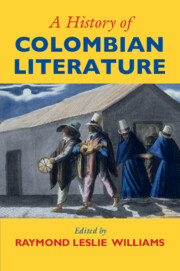Book contents
- Frontmatter
- Contents
- Notes on contributors
- Preface
- Introduction
- PART I LITERATURE AND SOCIETY IN COLOMBIA
- PART II COLOMBIAN CULTURE AND SOCIETY IN REGIONAL CONTEXTS
- PART III BEYOND THE BOUNDARIES
- 15 García Márquez as public intellectual
- 16 Women writers in Colombia
- 17 Colombian queer narrative
- 18 Extracting nature: toward an ecology of Colombian narrative
- 19 Visions of nature: Colombian literature and the environment from the colonial period to the nineteenth century
- 20 The intersections between poetry and fiction in two Colombian writers of the twentieth century: Álvaro Mutis and Darío Jaramillo Agudelo
- AFTERWORDS
- Index
18 - Extracting nature: toward an ecology of Colombian narrative
from PART III - BEYOND THE BOUNDARIES
Published online by Cambridge University Press: 05 June 2016
- Frontmatter
- Contents
- Notes on contributors
- Preface
- Introduction
- PART I LITERATURE AND SOCIETY IN COLOMBIA
- PART II COLOMBIAN CULTURE AND SOCIETY IN REGIONAL CONTEXTS
- PART III BEYOND THE BOUNDARIES
- 15 García Márquez as public intellectual
- 16 Women writers in Colombia
- 17 Colombian queer narrative
- 18 Extracting nature: toward an ecology of Colombian narrative
- 19 Visions of nature: Colombian literature and the environment from the colonial period to the nineteenth century
- 20 The intersections between poetry and fiction in two Colombian writers of the twentieth century: Álvaro Mutis and Darío Jaramillo Agudelo
- AFTERWORDS
- Index
Summary
From early costumbrista novels like Eugenio Díaz's Manuela (1858,Manuela) and Jorge Isaacs's María (1867. Maria, a South American Romance) up through more recent narrative by authors such as Gabriel García Márquez, Laura Restrepo, and Alfredo Molano, much of Colombian literature deals explicitly with the relationships between human societies and the environments they inhabit. In the nineteenth century, literary depictions of Colombian ecosystems most often looked to assess their value and possibilities for integration into postcolonial nation-building projects. Many twentieth- and twenty-first century works take a more critical stance toward these projects, drawing attention to the gaps between the political discourse of development and Colombia's socioeconomic realities and attesting to the effects of these modernizing projects for Colombia's diverse human populations and environments. Perhaps because of the nation's history of political conflict, however, critics have tended to focus almost exclusively on the representation of social relations in Colombian narrative, often discounting even the most detailed representations of local environments as the mere setting for social and political struggles. By singling out and privileging social representation, this style of criticism fosters a binary opposition that subordinates nature to the social in ways that are often not so clear in the works themselves, thus transforming what many authors present as complex, lived environments or “places” into abstract spaces for the elaboration of social theory.
Recent critical work has revisited this problem, examining more closely the specificity of relations between local societies and their environments as well as the dynamics of exchange, transculturation, and environmental modification that emerge in the incorporation of local environments into larger economic and political systems. In this chapter, representations of nature and social relations are revealed to be mutually constitutive rather than discrete categories. This ecocritical approach looks to disentangle the correspondences between aesthetics, social and political practices, economic regimes, and specific environments, while eschewing the kind of nineteenth-century environmental determinism that justified European neocolonialism by classifying the tropics as pathological spaces that engendered inferior, unbalanced, and ill human inhabitants. These studies remind us that social relations never exist abstractly; rather, they arise through regimes of material and symbolic practices employed in concrete environments at particular historical junctures.
- Type
- Chapter
- Information
- A History of Colombian Literature , pp. 363 - 405Publisher: Cambridge University PressPrint publication year: 2016
- 2
- Cited by



